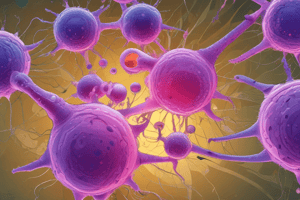Podcast
Questions and Answers
What are cytokines primarily classified as?
What are cytokines primarily classified as?
- Chemical enzymes used in digestion
- Cell membranes involved in signaling
- Soluble proteins secreted by immune cells (correct)
- Molecules targeted for destruction
Which of the following types of cytokines are primarily involved in directing cell migration?
Which of the following types of cytokines are primarily involved in directing cell migration?
- Chemokines (correct)
- Interleukins
- Monokines
- Lymphokines
How do cytokines initiate their actions?
How do cytokines initiate their actions?
- By releasing energy as heat
- By forming protein structures
- By binding to specific membrane receptors on target cells (correct)
- By neutralizing pathogens directly
Which cytokine is known to activate macrophages to destroy phagocytosed microbes?
Which cytokine is known to activate macrophages to destroy phagocytosed microbes?
Which of the following best describes the role of mononuclear phagocytes in immunity?
Which of the following best describes the role of mononuclear phagocytes in immunity?
What cellular response is typically activated by the binding of cytokines to target cells?
What cellular response is typically activated by the binding of cytokines to target cells?
Which of the following is NOT a type of cytokine mentioned?
Which of the following is NOT a type of cytokine mentioned?
Neutrophils are characterized by which of the following?
Neutrophils are characterized by which of the following?
What action occurs when a cytokine acts on the cell that produced it?
What action occurs when a cytokine acts on the cell that produced it?
Which interaction is characterized by two cytokines acting together on one cell?
Which interaction is characterized by two cytokines acting together on one cell?
Cytokines that act at a distance from the site of infection are classified as which type of action?
Cytokines that act at a distance from the site of infection are classified as which type of action?
Which of the following properties refers to different cytokines having similar effects on the same cell?
Which of the following properties refers to different cytokines having similar effects on the same cell?
Which category do cytokines like TNF and IL-1 belong to?
Which category do cytokines like TNF and IL-1 belong to?
What is a common mechanism for cytokines to activate gene expression in target cells?
What is a common mechanism for cytokines to activate gene expression in target cells?
What type of cytokine receptors is characterized by structural homologies among the extracellular binding domains?
What type of cytokine receptors is characterized by structural homologies among the extracellular binding domains?
Which cytokine is primarily involved in stimulating the production of red blood cells?
Which cytokine is primarily involved in stimulating the production of red blood cells?
Flashcards are hidden until you start studying
Study Notes
Overview of Cytokines
- Cytokines are soluble proteins secreted by immune cells, playing a crucial role in immune responses.
- Classified based on origin:
- Monokines (from mononuclear phagocytes)
- Lymphokines (from lymphocytes)
- Interleukins (produced by leukocytes, e.g., IL-1, IL-2)
- Chemokines, a subset of cytokines, guide cell migration.
Cytokine Induction and Function
- Cytokines are polypeptides produced in response to microbes and antigens upon cell activation.
- Actions are mediated through binding to specific membrane receptors on target cells.
- Cellular responses include gene activation, expression of new functions, and sometimes cell proliferation.
General Properties of Cytokines
- Cytokines may exert their effects locally or systemically, with various modes of action:
- Autocrine: affecting the same cell producing them
- Paracrine: affecting nearby cells
- Endocrine: affecting distant cells through circulation
Cytokine Actions
- Pleiotropism: One cytokine affects multiple cell types.
- Redundance: Multiple cytokines induce similar effects.
- Synergy: Two cytokines work together to enhance effect.
- Antagonism: One cytokine counteracts the effect of another.
Functional Categories of Cytokines
- Mediators of innate immunity include:
- Tumor necrosis factor (TNF), IL-1, IL-6, IL-12, Type I interferons (IFNs), IL-15, IL-18, and chemokines.
- Mediators of adaptive immunity include:
- IL-2, IL-4, IL-5, interferon-gamma (IFN-γ), transforming growth factor-beta (TGF-β), lymphotoxin (LT), and IL-13.
- Hematopoiesis stimulators include:
- Granulocyte-CSF, G-CSF; macrophage-CSF, M-CSF; GM-CSF; erythropoietin (EPO); thrombopoietin (TPO); stem cell factor (SCF).
Cytokine Receptors
- Classified into different types based on structure:
- Type I and II cytokine receptors
- Immunoglobulin superfamily receptors
- TNF receptors
- Seven-transmembrane α-helical receptors
- Signaling through cytokine receptors activates distinct pathways leading to gene activation, often involving second messenger systems like JAK-STAT pathways.
Key Immune Cells Involved
- Mononuclear phagocytes serve as primary cytokine sources in innate immunity, producing TNF, IL-1, and other key cytokines.
- Neutrophils, short-lived yet most abundant circulating white blood cells, are crucial for initial inflammatory responses.
- Natural killer (NK) cells play a role in secreting IFN-γ to enhance macrophage activity against pathogens.
Conclusion
- Cytokines play essential roles in coordinating the immune response, with distinct activities influenced by their source, target cell type, and interaction with specific receptors.
Studying That Suits You
Use AI to generate personalized quizzes and flashcards to suit your learning preferences.




